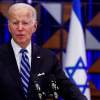Modern 'Roads to Rome': From BRI and IMEC to Israel

"All roads lead to Rome'' was historically popularised as an imperial and religious phrase. Emperor Caesar Augustus (Octavian) set the imperial tone by measuring the distance of conquered capitals from Rome's Milliarium Aureum. That was more than two millennia ago. One millennium ago, French poet Alain de Lille's apt comment, "thousand roads lead man forever toward Rome," targeted the Roman Catholic Church. Does the term's surging popularity in recent times reflect an imperial or theological return? Or does it echo the formation of a new frontier?
Contexts clarify. A recent case reverses both phrases. In March 2024, Italy decided to leave China's Belt Road Initiative (BRI). As the first G7 country to do so, it shook China's global search for a personified "Rome." China's once fabled Great Silk Road ended very close to Rome, making Venice one of the greatest entrepôts between three continents—Africa, Asia, and Europe—and three 13th Century empires—Byzantine, Holy Roman, and Mongol, extending to Arabia, India, and Persia too.
Italy's BRI exit grimly parallels growing western uneasiness with China. The West is unhappy with China propping Russia in the Ukraine war while challenging the World Bank development plans through the Asian Infrastructure Investment Bank (AIIB). In return, they have escalated de-risking policies and financial strategies with other countries, with the exodus of Western multinational corporations from China. The net effect darkens an already bleak global picture.
The British Gas (BG) Group discovered fossil fuels off the Gaza and Levant coastline between 1999 and 2013, opening up another global context, while the India-Middle East-Europe Economic Corridor (IMEC) adopted by the G20 Summit in New Delhi this year represents a third. While Britain and BG face global rebuke for the slaughter of Gaza residents, IMEC elevates a different 21st century rivalry, between China and India. Both these countries boast one of the world's largest bilateral trade relationships. Yet when India displaced China as the world's most populous country this year, scholars and policy-makers scrambled to their drawing-boards to paint expected outcomes.
If India's IMEC proposal opens another "road to Rome" it may also explain why Saudi Arabia and the United Arab Emirates (UAE) downplay the Gaza crisis (as, too, a bulk of the 57 Muslim countries in the world). Business means more than Muslim ummahs (alliance).
On the other hand, Hamas' October 7 attacks demand methodical attention. Though such reprehensible actions must be strongly reprimanded, punishing Gaza residents indiscriminately for them (instead of Hamas) and equating those events with 9/11, is concerning. Could Israel's ethnic cleansing operations in Gaza, now targeting the South, be the precursor of a trillion-dollar gas-processing community? Possessing one of the world's most efficacious intelligence services, Israel correctly detects (and bombs) nuclear breakthroughs. Take for example, the Israeli Air Force destroying an unfinished Iraqi nuclear reactor in 1981. Yet, in 2023, Israel miserably failed to notice Hamas' preparations along the heavily fenced border. Next door, Egypt also ignored Gaza both before and after October 7. It would not be far-fetched to assume that Egypt secretly discussed oil discoveries with Israel in 2021. And why should it not? The United States also knew about them: more than a decade ago, the US Geological Survey (USGS) estimated that 120 trillion cubic feet of recoverable gas reserves lie beneath Levant Basin Province in the Eastern Mediterranean. Is the lone-wolf US support for Israel—initially thriving with support from Canada, France, United Kingdom, and India—accenting the value of material gains over human lives?
Business deals enrapture geopolitical interests. Infosys, an IT firm owned by British Prime Minister Rishi Sunak's father-in-law in India, first teamed with British Petroleum (BP) and Israeli companies to explore North Sea gas fields (upsetting local environmentalists), then proceeded onto the Mediterranean Sea. Traditional alignments between businesses and political parties, such as the Conservatives and Republicans in the UK and US, have penetrated pro-worker counterparts—like in the Labour Party in the UK and the Democratic Party in the US—splitting them over the Gaza issue. Both US President Joe Biden and UK Labour Party leader Sir Keir Starmer are facing their electoral rubicon in 2024; the latter is already bartering his own electoral advantages to join Sunak's "no ceasefire" campaign. This begs the question: is democracy irrevocably changing its course geopolitically?
If India's IMEC proposal opens another "road to Rome" it may also explain why Saudi Arabia and the United Arab Emirates (UAE) downplay the Gaza crisis (as, too, a bulk of the 57 Muslim countries in the world). Business means more than Muslim ummahs (alliance). Both these Middle East countries were set to recognise Israel before this Gaza crisis erupted, perhaps driven by yet another Gaza development plan: to build a Suez Canal alternative. French diplomat Ferdinand de Lesseps constructed it between 1856 and 1869 with a 99-year lease. When Egyptian President Gamal Abdel Nasser nationalised it in 1956 (with Indian support)—13 years before the lease was over—as the largest Suez Canal shareholders, France and the UK declared war upon Egypt, and were joined by Israel. A second canal in the Suez peninsula only feeds Israel's and the West's interests, and business from African/Arab dependence.
Anglo-French collaboration had earlier secretly produced the Sykes-Picot Agreement in May 1916, allocating Palestine to Great Britain (among other territorial distributions). Next year Lord Arthur Balfour proposed a "homeland" in Palestine to the Zionist Federation of Great Britain and Ireland through Lord Rothschild. Jews fleeing persecution across Europe from the 19th century, particularly from Tsarist Russia, were directed to target Palestine by the First Zionist Organization in 1897, meeting in Basel under Austro-Hungarian Jewish activist, Theodor Herzl. An increasingly radicalised movement snatched Jewish history, and invented a road to their own "Rome" long before Adolf Hitler, the Holocaust, and Auschwitz forced Europe to find a sine qua non outlet for persecuted Jews.
Economically restructuring the Suez area entails enormous political consequences: African/Arabian interests subsided across Europe for not supporting European countries over Ukraine, but they spiralled elsewhere through an emerging Global South identity and by the membership-expanding BRICS. Even by inviting Saudi and UAE as members this year, BRICS must monitor India's alignments warily, owing to China's rivalry. Angling in western waters while inducting the African Union into G20 membership this year, India has taken on the role of a global broker. It can be argued that the way it has balanced economic trajectories and different ideological identities have muted global cries for a Gaza ceasefire.
Yet India's bridgehead Mideast role could also inflame future global relations. Implementing its IMEC G20 proposal would in all likelihood distance China further, rock the boat carrying over 150 extant BRI members, and though far from being a BRI competitor globally, it would give India that strategic global salience that the ideological nonaligned leadership from 1955 did not. Today's overtures in the Global South are even less likely to do such. As it happened in Israel's case, the Indian diaspora can also forge an Indian "Rome" anywhere (London is one, with pivotal leaders being of Indian ethnicity, just as Washington DC has long been Israel's). Alas, the actual Rome: in IMEC's planned pathway, it is only a footnote in business scrambles, and bears lower relevance in today's rapidly evolving global setting.
Dr Imtiaz A Hussain is professor of global studies and governance department in Independent University, Bangladesh (IUB).
We welcome your contributions and analysis of global events. To submit articles to our new page, Geopolitical Insights, please send us an email at [email protected].
Follow The Daily Star Opinion on Facebook for the latest opinions, commentaries and analyses by experts and professionals. To contribute your article or letter to The Daily Star Opinion, see our guidelines for submission.

 For all latest news, follow The Daily Star's Google News channel.
For all latest news, follow The Daily Star's Google News channel. 









Comments